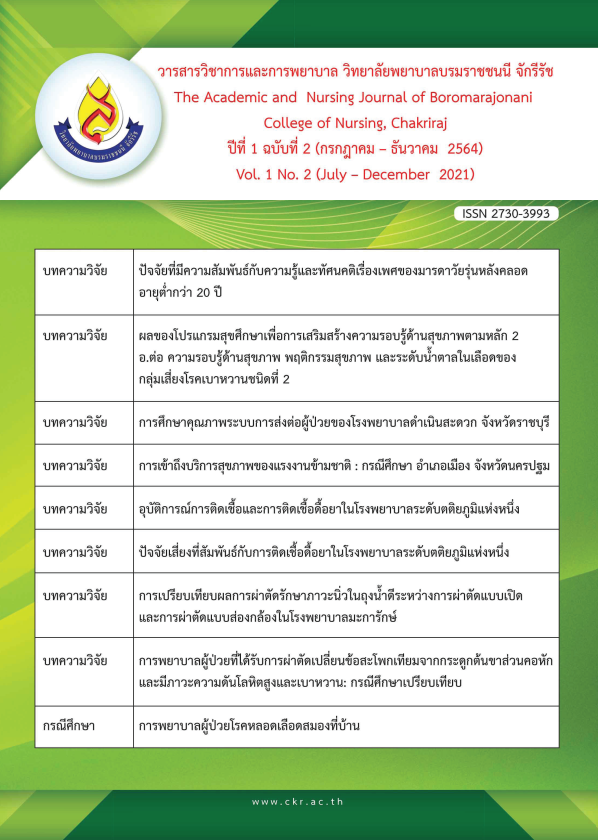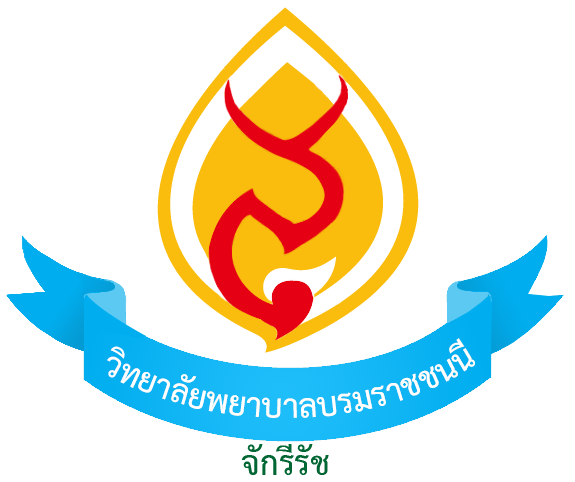The Effects Of Health Literacy Enhancement Program According To 2 Aor. Principles On Health Literacy, Health Behavior And Blood Sugar Level Of People With Type 2 Pre-Diabetes Mellitus
Keywords:
Health Behavior, Health education program for enhancing health literacy according to the principles of 2 A., Risk 0f type 2 diabetes, Health LiteracyAbstract
This quasi-experimental research, one group pretest posttest design, aimed to study the effect of a health education program for enhancing health literacy according to the 2 Aor. principles on health literacy, health behavior and blood sugar levels in the risk group for type 2 diabetes. The sample was people aged 35-59 were screened for diabetes and had a blood sugar level ranging from 100-125 mg/dL, 34 subjects, and they were selected by purposive sampling. The research instrument was a health education program for enhancing health literacy in accordance with the principles of 2 Aor. of the Division of Health Education, Ministry of Health and the questionnaire about health literacy and health behaviors according to the principle of 2 Aor. (food and exercise). Content validity = .80 Cronbach's alpha co-efficiency was .96. Data were analyzed using frequency, percentage, mean, standard deviation and paired t-test. The results found that after receiving the program; people at risk of diabetes had statistically significant higher mean scores of health literacy than before receiving the program. (p<.05) And they had statistically significant higher mean score on health behaviors than before receiving the program (p<.05). Moreover, it was found that people at risk of diabetes had statistically significant decrease in blood sugar level than before receiving the program (p<.05).
Downloads
References
World Health Organization (WHO). global tuberculosis report 2017. Geneva: world health Organization; 2017
Guariguata L, Linnenkamp U, Beagley J, Whiting DR & Cho NH. Global estimates of the prevalence of hyperglycaemia in pregnancy. Diabetes Research and Clinical Practice. 2014;103(2),176-185.
.
อภิญญา อินทรรัตน์.ความฉลาดทางสุขภาพของผู้ประกอบวิชาชีพด้านสุขภาพ.วารสารพยาบาลทหารบก. 2557;15(3): 174-178.
แสงเดือน กิ่งแก้วและนุสรา ประเสริฐศรี. ความสัมพันธ์ระหว่างความฉลาดทางสุขภาพและพฤติกรรมสุขภาพของผู้สูงอายุที่เป็นโรคเรื้อรังหลายโรค. Nursing Journal of The Ministry of Public Health. 2558;25(3), 43-4.
กองสุขศึกษา, กรมสนับสนุนบริการสุขภาพ.โปรแกรมสุขศึกษา เพื่อการเสริมสร้างความรอบรู้ด้านสุขภาพตามหลัก 2 อ.(อาหาร ออกกำลังกาย) ในการป้องกันโรคเบาหวานและโรคความดันโลหิตสูง สำหรับวัยทำงาน. นนทบุรี: กระทรวงสาธารณสุข. 2561.
Faul F, Erdfelder E, Lang AG, & Buchner A. G*Power 3: A flexible statistical power analysis program for the social, behavioral, and biomedical sciences Behavior Research Methods. 2007;39:175-191
เอื้อจิต สุขพูล ชลดา กิ่งมาลา ภาวิณี แพงสุข ธวัชชัย ยืนยาว และ วัชรีวงค์ หวังมั่น. ผลของ โปรแกรมการพัฒนาความรอบรู้ด้านสุขภาพและ พฤติกรรมสุขภาพสำหรับประชาชนกลุ่มวัยทำงาน. วารสารวิชาการสาธารณสุข. 2563;29(3): 419-429.
ภคภณ แสนเตชะ และประจวบ แหลมหลัก. ผลของโปรแกรมพัฒนาความรอบรู้ด้านสุขภาพผู้ป่วยโรคเบาหวานชนิดที่ 2 ตำบลแม่ปืม อำเภอเมือง จังหวัดพะเยา. วารสารสุขศึกษา. 2563;43(2):150-164.
แสงเดือน กิ่งแก้ว และนุสรา ประเสริฐศรี. ความสัมพันธ์ระหว่างความฉลาดทางสุขภาพและพฤติกรรมสุขภาพของผู้สูงอายุที่เป็นโรคเรื้อรังหลายโรค. วารสารพยาบาลกระทรวงสาธารณสุข. 2558. 25(3): 43-54.
Downloads
Published
How to Cite
Issue
Section
License

This work is licensed under a Creative Commons Attribution-NonCommercial-NoDerivatives 4.0 International License.
บทความที่ได้รับการตีพิมพ์ ถือเป็นลิขสิทธิ์ของวิทยาลัยพยาบาลบรมราชชนนี จักรีรัช คณะพยาบาลศาสตร์ สถาบันพระบรมราชชนก ข้อความที่ปรากฏในบทความแต่ละเรื่องในวารสารวิชาการและการพยาบาล วิทยาลัยพยาบาลบรมราชชนนี จักรีรัช เล่มนี้ เป็นความคิดเห็นส่วนตัวของผู้เขียนแต่ละท่าน ไม่เกี่ยวข้องกับวิทยาลัยฯ และคณาจารย์ท่านอื่นในวิทยาลัย ฯ แต่อย่างใด ความรับผิดชอบองค์ประกอบทั้งหมดของบทความแต่ละเรื่อง เป็นของผู้เขียนแต่ละท่าน หากมีความผิดพลาดใด ๆ ผู้เขียนแต่ละท่านจะรับผิดชอบบทความของตนเองแต่ผู้เดียว





